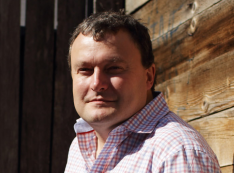Guardian’s global CEO labels Fairfax and News metered paywall model ‘worst in the world’

Andrew Miller, CEO of Guardian Media Group
The global CEO of The Guardian Andrew Miller has labeled the strategy of the metered paywall model adopted locally by News Corp and Fairfax Media as “the worst in the world”.
Miller made the comments in an exclusive interview with Mumbrella’s sister title Encore during his visit to Australia as the local arm of The Guardian’s operation approaches its six month anniversary.
He questioned the concept of metered paywalls – giving free content to occasional visitors but asking regular visitors to pay – saying: “That to me is the worst paywall in the world – the more loyal you are the more you are forced to pay. I just don’t get that logic.”
Yet Miller refuses to rule out a paywall model for The Guardian, adding: “Never say never but at this stage there is too much to play for in reach and it is about who is going to get that readership. Once you have that, you can think about monetising the readers more directly but I think that’s still some time off.”
His signal that The Guardian may contemplate a paywall in the future was echoed last night by the editor of The Guardian, Alan Rusbridger, who is also in Australia. Interviewed on stage at Sydney Opera House by Annabel Crabb, Rusbridger followed a similar line on the possibility of The Guardian one day charging for content, but was less critical than Miller on the model adopted by the big players locally saying: “We are not fundamentally about being free. It works for us at the moment. But it doesn’t mean we write it off forever, or that Fairfax is wrong or that the Murdochs are wrong.”
“It’s not true to say there’s no money in digital.”
The Guardian’s Australian operation now has more than 30 staff.
Miller said: “I want to be seen as a company riding the second wave of digital extremely well. That means I have to be competing with the like of HuffPo, Buzzfeed, Vice and people like that,” he said.
“A 20-year-old is consuming their news in a very different way to the traditional newspaper reader and that’s why we have to keep working in a non paywall format because all these guys’ business models are based on that.”
Miller said the new Australian operation, run by launch editor Katharine Viner had “exceeded expectations” and was now the third largest market behind the UK and US. He said: “We are beating the audience numbers we expected. We are much further ahead on the revenue. Traffic has moved by around 25 to 30 per cent since we launched.”
Rusbridger added to that last night, saying in his interview: “We’ve made four times as much money as we thought we were going to, so I think it will be profitable.”
Meanwhile, Miller said that the Australian launch would be a springboard for a push into Asia. He said: “One of the reasons I’m here is to explore how we build out. “There just seems to be an obvious opportunity to build our journalism out but how we do it is a question. Chasing countries is the wrong approach. Chasing themes and building off our geographic footprint in Australia, then into maybe Southeast Asia, is something of interest.” 
Asked to expand on his remark Miller emphasised that any planning was still in its “early stages” but was clear that expansion is on the cards.
“Building out from Australia into the region is definitely of interest,” he said. Miller also spoke about The Guardian’s recent global expansion and spoke for the first time about the role of philanthropist Graeme Wood in helping fund its new Australian expansion.
“We chose New York first and we now have 50 people there, 12 are commercial and the rest editorial,” said Miller.
“Then in Australia, we got the opportunity to accelerate what we were going to do because of Graeme Wood’s investment.”
Miller was clear the philanthropist was not involved in editorial adding: “This is an investment for Graeme Wood, he has given the money completely at arms length and he does not get involved in the running of this at all. The editorial aspect has always been completely independent.”
Globally, The Guardian has seen losses of £30.9m, but operations are subsidised by the substantial Scott Trust. Asked if the satellite ventures like the New York and Australian offices would ever be profitable Miller said: “Absolutely. We wouldn’t be doing this purely for the journalism. There has to be a plan that is profitable and Graeme sees this as an investment just like we do.”
Rusbridger added: “He wants his money back. Whether he gets his money back is subject to the carefully crafted wording in the contract.”
Miller also committed to the future of the print edition of international newspaper The Guardian Weekly, saying that as long as it too remained profitable it would continue.
“Last week we worked out The Guardian was consumed on 5,561 variants of products,” he said.
“One of those is the The Guardian Weekly, and if it is profitable and positively contributing to the cost base then we will keep it. If it’s not, or it doesn’t fit the overall direction we want to move, then we wouldn’t.
“Right now, The Guardian Weekly is a profitable product with a good audience – a very different audience from other digital products – and therefore one we would keep going.”
Nic Christensen
 This article first appeared in Encore. Download it now on iPad, iPhone and Android tablet devices.
This article first appeared in Encore. Download it now on iPad, iPhone and Android tablet devices.




Interesting. The Guardian folk have, up to now, had a somewhat eccliastical attachment to the freebie. Maybe the erosion of the piggybank is starting to get their attention? Anyhow, I predict they will have a paywall within 12 months.
As for the crit of oz paywalls: is that the best he can do? Surely Miller has noticed that the sites are crap? That they have allowed traffic monkeys to mess with their editorial juju? Isn’t that why they set up here?
User ID not verified.
So the Guardian Weekly will remain because, and as long as it is profitable. Fair call. So what then are the unprofitable parts of the Guardian empire (and there must be a lot since they are losing $50m/year and have been for as long as I can remember)? And when will they be closed, given their stated strategy is to stick with products only as long as they are profitable? All very well criticising those publishers who have put paywalls up but the Guardian’s alternative model can hardly be held up as being successful (ie profitable)
User ID not verified.
The paywall is problematic, but then all the models are. Eric Beecher’s article in the monthly “The death of Fairfax and the end of newspapers” – which I recently read after seeing a link from Andrew Stafford’s piece on this site – put it well. If we want “journalism” rather than pure clickbait then sooner or later (probably sooner) all we’ll be left with is the public broadcasters and the subsidisers (papers either paid for by philanthropic funds or by Foxtel’s English Premier League subscribers). Fairfax it seems, has paywall because they’ve no other options left other than even more downsizing. The Oz, has paywall I suspect with a more “optimistic” outlook because they can get away with treating their subscribers that way. I don’t want to be offensive but its true that the Oz is unique in having a significantly older, significantly less tech-savvy readership than most papers. The kind of people you can charge for a product others are offering free. This gives a few years, a tiny trickle of extra cash – but in the end its not a good system and it will eventually end as the readerships that puts up with it quite literally dies off. But until that day comes, they will enjoy the tiny bit of extra money.
On a side note the Guardian coming here interests me a great deal purely because I have to wonder why it took so long. Surely they could have come years ago and hoovered up the money that existed back then. Just gotta wonder why the international media organisations took so long to figure out Oz was crying out for a competitor.
User ID not verified.
@ Well he would that: Quite. The Scott Trust which subsidises the Guardian’s highly unprofitable operations is a finite resource. That subsidy will be turned off in the not-too-distant future. Then we’ll see how the Guardian goes about competing in the real world…….
User ID not verified.
As both Fairfax and NewsCorp have suffered massive across the board hits in circulations and subscribers for print and have provided fuzzy numbers for their digital, none of this should be any surprise. I won’t be paying Fairfax’s outrageous subscription costs. Not only DON’T Fairfax reward loyalty, they actively discourage it. As a long time SMH subscriber, I get no refund on my print subscription when I don’t wish to receive it if away but am told that it’s because I can access the digital version. I don’t either are the same. Add to the fact that the SMH’s cover price increased and you’ll get some sense of the ridiculous nature of Fairfax’s attitude to paywalls etc. I currently pay US$0.99 per week for the NYTimes digital for quality journalism and a great site. Let’s see Fairfax and News Corp do as well and stop taking Australian readers for a ride.
User ID not verified.
I think it’s pretty easy to see how The Guardian will survive in the real world: it is one of very few newspapers from any country that is transcending national borders and becoming a global brand, the others include The Financial Times, The Daily Mail and The New York Times.
The New York Times has a disadvantage as its name refers to New York and in the same way Sydney Morning Herald would be disadvantaged but if Fairfax have any ambition why aren’t they launching The Age in the UK and the US?
Meanwhile The Guardian can pay someone not much to provide an article about parsley and feta pies and monetise it with far more traffic in AU, US and UK than almost anyone else, profit can’t be far behind.
http://www.theguardian.com/lif.....fish-kofte
User ID not verified.
“The Oz, has paywall I suspect with a more “optimistic” outlook because they can get away with treating their subscribers that way.”
What claptrap. The Oz loses News a fortune every year. It’s a non-profit hanging off a profit centre, just like The Guardian.
User ID not verified.
@Bill. The Guardian has no profit centre. It has a trust, which is finite.
User ID not verified.
They might be profitable soon based on their 30 staff. But 90% of their editorial still comes from the Guardian team in london. Wait until london start to re-charge them for that content. it wont look so rosy then.
User ID not verified.
@Good Moron: and yet despite being a global brand which transcends national borders, the Guardian continues to hemorrhage money. As you say, the FT and NYT are also global brands, but they are monetising their digital audiences far more effectively with a combination of advertising and circ revenue (aka paywalls) than the Guardian is with it’s quasi-religious no-paywall mantra. Daily Mail also a global brand and is doing better revenue-wise than the Guardian but still not great given the size of its global audience.
User ID not verified.